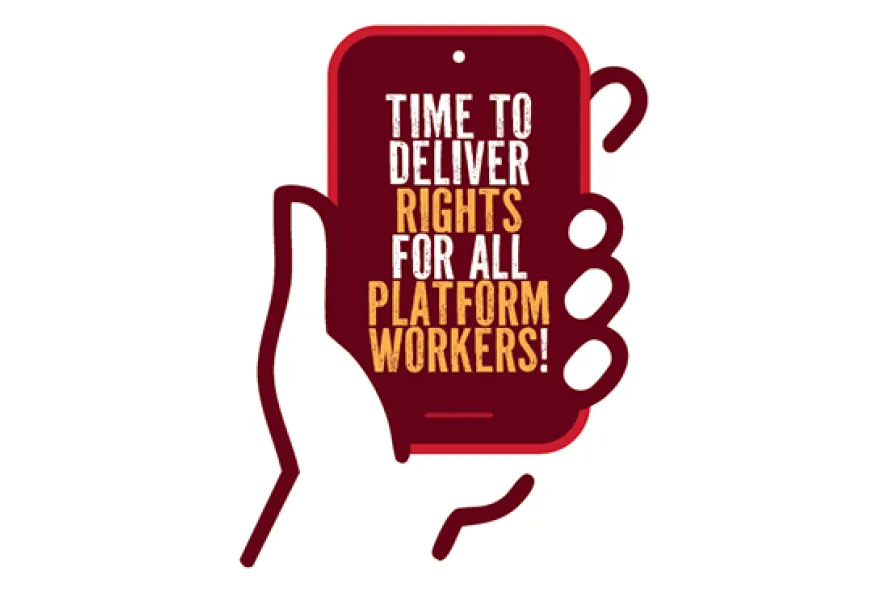This weekend, the NEU holds a special conference to debate changing its approach to organising teaching assistants, which a 2017 TUC agreement forbids. General secretary DANIEL KEBEDE outlines the choices before delegates
TONY BURKE says an International Labour Conference next month will try for a new convention to protect often super-exploited workers providing services such as ride-hailing (taxis) such as Uber as well as fast food and package delivery


THE International Trade Union Confederation (the global network of national trade unions representing 200 million workers) has launched a campaign to secure a legally binding International Labour Organisation (ILO) convention which will provide employment protection for all workers in the platform economy.
The ILO is the tripartite international body that represents governments, employers, and workers and its primary role is to set and enforce standards agreed upon by the tripartite body through an adopted Convention.
The term “platform workers” or “gig workers” was coined over a decade ago to describe workers and companies providing services such as ride-hailing (taxis) such as Uber as well as fast food and package delivery.
However the term now covers many more workers and companies who utilise online platforms on smartphones, tablets or computers to connect with clients and customers offering services or performing tasks in exchange for payment including care giving, building services, software development, graphic design — either “on location” or “online” where platform workers carry out tasks remotely.
Most platform workers have no employment status with platform businesses, which argue that the workers providing these service are not employees but are “independent contractors,” “partners” or “associates” — effectively self-employed who utilise online platforms, via websites or apps, to find and connect with clients seeking their services.
In the UK the TUC calculates that 14.7 per cent of working people in England and Wales (approximately 4.4 million people) undertake platform work at least once a week.
Over the past few years unions such as the GMB at Uber have launched organising campaigns and legal action to win basic union recognition.
In Scandinavia and the United States unions and legislators including local authorities or licensing organisations have used legal routes to ban platform working outright. These have encountered employer and business challenges. With platforms becoming global and more common across a growing number of sectors, and faced with the rapid development of artificial intelligence, it has been an uphill battle for trade unions and workers wanting to form unions.
Platform workers face low pay, exploitation, mistreatment, poor working conditions and exclusion from social protections including working time and healthy and safety protections.
Platform companies continue to argue that platform workers have no employment relationship with them and therefore should not be covered by labour laws.
The ILO’s International Labour Conference (ILC) in June this year will decide on adopting a new convention giving legal protection to platform workers. Unions and human rights organisations have expressed support for a convention, but employers and some governments will push back hard, either to stop the process or, if the ILC agrees to move to a legally binding convention, to try water down its effectiveness to a “recommendation” or otherwise toothless instrument.
The ITUC, which will be leading the debate at the conference, says a new convention should include:
Guaranteeing basic labour protections, including living wages, occupational safety and health, and access to social security
Ensuring fundamental rights, including freedom of association and the right to collective bargaining, for all platform workers
Regulating working hours and safeguarding the right to disconnect
Addressing algorithmic management by regulating its use in surveillance, decision-making, and worker evaluation, while ensuring transparency and human oversight.
Combatting worker misclassification and requiring clear terms and conditions in contracts
Protecting migrant workers, who are disproportionately represented in platform work, regardless of migration status
“Platform workers are not commodities. They deserve dignity, fair pay, the right to freedom of association and effective collective bargaining,” says ITUC general secretary Luc Triangle.
He explains: “A binding ILO convention is essential to ensure global standards that protect all workers in all countries, regardless of how their work is organised or classified. Without decisive action, the exploitation inherent in the platform economy could spread to all sectors of work and the economy, undermining democracy and fair competition globally.”
Having gone through its initial stages of providing reports and questionnaires the fight is now on to secure a binding international treaty that recognises that, like electricity, platform working will not be uninvented and the consequences for the world of work are enormous.
The International Labour Conference takes place between June 2-13 in Geneva, Switzerland.
Tony Burke is co-chair of the Campaign For Trade Union Freedom

The Bill addresses some exploitation but leaves trade unions heavily regulated, most workers without collective bargaining coverage, and fails to tackle the balance of power that enables constant mutation of bad practice, write KEITH EWING and LORD JOHN HENDY KC

It is only trade union power at work that will materially improve the lot of working people as a class but without sector-wide collective bargaining and a right to take sympathetic strike action, we are hamstrung in the fight to tilt back the balance of power, argues ADRIAN WEIR













